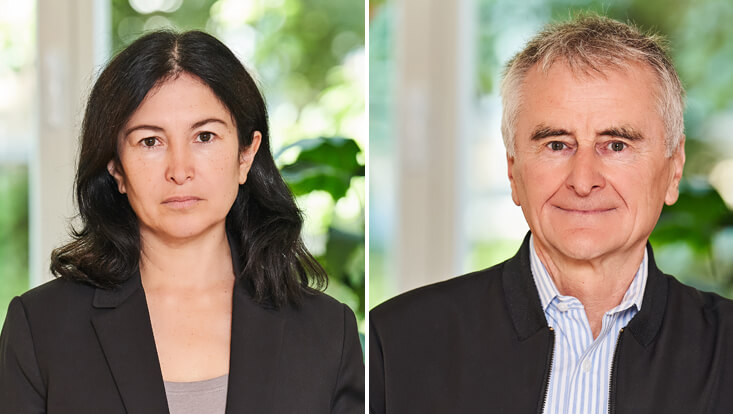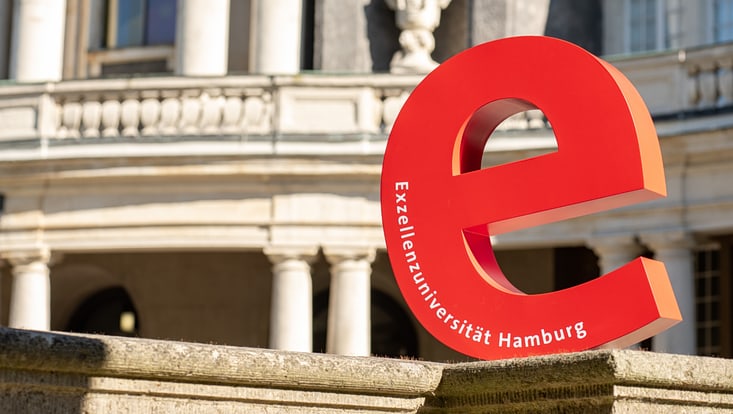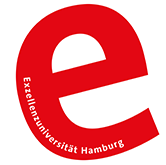New Advanced Fellows in Hamburg“Without the fellowship, such an idea would probably never have occurred to me.”
12 January 2023, by Christina Krätzig

Photo: Hias/C. Höhne
Once a year, Universität Hamburg, together with other Hamburg universities, invites researchers and artists from around the world to spend several months studying in Hamburg. This winter's fellows include international law scholar Prof. Dr. Elvira Pushkareva and landscape architect Prof. Dr. Eckart Lange. Their fellowships are funded by the Excellence Strategy of the German Federal and State Governments.
Mr. Lange, you taught as a professor at the University of Sheffield for almost 20 years and are now retired. How did you come to apply for an Advanced Fellowship here in Hamburg?
I am interested in the visualization of landscaping proposals and how digital images influence planning processes. This topic has long preoccupied me and I am currently writing a book on it. In Hamburg, I now have time for this, without daily obligations.
Ms. Pushkareva, how did you come to apply for an Advanced Fellowship here in Hamburg?
I work in international and environmental law and have worked as a consultant to many large organizations, such as the United Nations and the Word Wildlife Fund. As a native Russian, the start of the Ukraine war hit me hard. With my work here in Hamburg, I hope to contribute to a less dramatic destruction of the environment in this as well as in future conflicts.
Isn't the environment secondary when people die in a war?
In the years following a war, unfortunately, even more people usually die than during the conflict itself. This is due to the destruction of the environment and of people's livelihoods. I am sure that if environmental protection aspects were taken into greater account in international agreements like the Hague and Geneva Conventions from the very beginning, this could mitigate the consequences of war. How this idea could be implemented in international treaties and humanitarian response is what I am working on here in Hamburg. In 2022 the international community took a big step forward in this direction; the UN International Law Commission developed the principles on protection of the environment in relation to armed conflicts.
Mr. Lange, what in particular piqued your interest in Hamburg?
I am especially fascinated about the planning challenges of cities on water, especially if these are subject to dynamic tidal rhythms and the risk of flooding. This perfectly describes Hamburg and the Hafencity harbor district, the development of which I have followed closely. I have also done a lot of research on the 20-million-strong Chinese city of Guangzhou in the Pearl River Delta. As they do here, the urban planning projects there have increasingly involved 3D modeling and visualization.
Is that a problem?
These images can give simulate a reality at an early stage in the planning process to decision-makers even though detailed decisions have usually not yet been made. Furthermore, many important factors usually get sidelined in the visualization process: background noise, for example, the feel of the material, or the climate in a given district. The visualization of a reality and the associated sensory experiences can significantly influence the planning process. That is exactly what I want to find out more about.
Ms. Pushkareva, what attracted you to the Advanced Fellowship funding program?
The internationality and interdisciplinarity of the fellow group. Each and every one of us works on a project in a different research field, but we constantly exchange ideas and discuss them. Each week one of us shares ideas and conclusions at the follow-up dinner, kindly organized by the HIAS staff, where we can continue the discussion in a nice atmosphere. For example, one fellow from the United States has an interest in understanding the abundant life that is now known to exist deep within the rocks of the continents and on the ocean floor. Our discussions related to this topic gave me new inspiration in my field of work, environmental law. Another colleague is an experimental composer. She visualizes her ideas in music, for example, in her opera Speechless, which will be soon performed in Hamburg. I had never seen anything like that before! And suddenly the thought popped into my head as to whether that would be possible for international treaties, whether it is possible to visualize them through art. Without the fellowship, such an idea would probably never have occurred to me!
Advanced Fellowships funding program
Every year, up to 20 fellows live and work in Hamburg for 3 to 10 months. Researchers and artists from all over the world (with the exception of residents of Hamburg) are welcome. Fellows are taken care of by the Hamburg Institute for Advanced Study, which is funded by 9 Hamburg academic institutions. A share of the funding comes from the Excellence Strategy of the Federal and State Governments.



